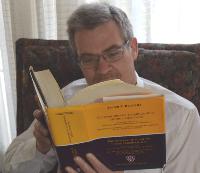How do you digest what you translate? Thread poster: Reed James
|
|---|
Reed James
Chile
Local time: 23:24
Member (2005)
Spanish to English
Hello. No, I don't mean eating your words. What I would like to know is: during and after translating a document, do you understand the complete message in both languages simultaneously, just the sentence or segment you translate at the moment in the target language, or does it just pass through the eyes and out the fingers never to be recalled again?
Reed
| | | | | I understand the whole story once I have finished | Dec 14, 2006 |
Dear Reed,
I usually start translating without reading any of the text first, and it takes me a page or two to know what it is about, during which time I meanwhile choose some words inappropriately.
Once I start to get into the swing of it, I eventually follow the story with great eagerness, and, by the end, I am choosing exactly the right words. However, there were usually one or two problem patches here and there, along the way, that I could not make sense of.
<... See more Dear Reed,
I usually start translating without reading any of the text first, and it takes me a page or two to know what it is about, during which time I meanwhile choose some words inappropriately.
Once I start to get into the swing of it, I eventually follow the story with great eagerness, and, by the end, I am choosing exactly the right words. However, there were usually one or two problem patches here and there, along the way, that I could not make sense of.
The rewarding part is then to print it off and proofread it against the original, and at this stage the whole story becomes entirely clear, the problem patches dissolve and the choice of words becomes obvious, and at this point I am then digesting the entire story in both language simultaneously. This is finally the enjoyable part.
Astrid
[Edited at 2006-12-14 19:29] ▲ Collapse
| | | | Reed James
Chile
Local time: 23:24
Member (2005)
Spanish to English
TOPIC STARTER | How would you describe your understanding of the content, Elke | Dec 14, 2006 |
Thank you for your interesting post, Elke. When you get the bilingual intake of the information, do you find you understand it better than if you were reading just the source language? Does it enhance your understanding of a particular subject?
Reed
| | | | | Good question | Dec 14, 2006 |
Yes, now I think about it. Actually, I translate on some subjects that I did not know the terminology of when I left Britain 10 years ago - for example, the Internet. In that case, I have originally learnt and absorbed all the information exclusively in the source language, so I understand the source language better than if I were to read an article on the same thing in the target language.
However, translating such material, which is more familiar in the source language, does enhan... See more Yes, now I think about it. Actually, I translate on some subjects that I did not know the terminology of when I left Britain 10 years ago - for example, the Internet. In that case, I have originally learnt and absorbed all the information exclusively in the source language, so I understand the source language better than if I were to read an article on the same thing in the target language.
However, translating such material, which is more familiar in the source language, does enhance my understanding of it, I think, particularly at the proofreading stage, where - as I said - the entire story becomes clear, but also earlier at the research stage, through having to read around the subject in the target language.
I think that anyone who were to claim that having the text available in both languages (after translating it) did not enhance their understanding of the subject, would not be a translator. For, at least at the final stage, we also have to consider emotional impact, register, etc. - which is always present to some greater or lesser degree, even when a technical invention is being described. If we do not do so, the translation is not as close as possible to the source.
The very final stage of the translation (aside from writing the invoice) is also probably an - at least unconscious - decision about what action, if any, has to be taken on the basis of the newly acquired information - which is what I was asking about in my poll a few days ago.
Astrid ▲ Collapse
| | |
|
|
|
femmy
Local time: 09:24
English to Indonesian
+ ...
| Better understanding, yes | Dec 16, 2006 |
I would absolutely say that I have a better understanding of any material that I translate. Sometimes, when I read a good book, especially with a difficult or convoluted language, I wish that I were translating it so that I would understand it better.
But I would not say that the enhanced understanding is the result of the bilingual intake. Rather, it is the result of the research I do in order to understand the source text.
For example, I recently translated Thrity Um... See more I would absolutely say that I have a better understanding of any material that I translate. Sometimes, when I read a good book, especially with a difficult or convoluted language, I wish that I were translating it so that I would understand it better.
But I would not say that the enhanced understanding is the result of the bilingual intake. Rather, it is the result of the research I do in order to understand the source text.
For example, I recently translated Thrity Umrigar's "The Space Between Us". There are plenty Indian terms that I would have glossed through if I were only reading it. But because I was translating it, I had to compile a glossary, and as a result now I know more about Indian and Parsi culture (see http://www.google.com/notebook/public/02263211073669132693/BDQQ2IgoQpYDVrr0h) ▲ Collapse
| | | | | reading and translating | Dec 16, 2006 |
I find that my translator's habits often interfere with my reading in languages I'm not native in.
For instance, at the moment I'm reading James Ellroy's "American Tabloid", and I have to make a consciuos effort to block my tendency to seek ways to translate specific words, phrases and expressions into Italian - i.e. to strive for what you call "bilingual undestanding" - instead of simply reading it.
A few days ago I lost myself in musing upon the word "spic" and possi... See more I find that my translator's habits often interfere with my reading in languages I'm not native in.
For instance, at the moment I'm reading James Ellroy's "American Tabloid", and I have to make a consciuos effort to block my tendency to seek ways to translate specific words, phrases and expressions into Italian - i.e. to strive for what you call "bilingual undestanding" - instead of simply reading it.
A few days ago I lost myself in musing upon the word "spic" and possible ways to translate it - non-standard, racially charged, but with a specific hue of racism, tied to time and place (and here in Italy, after all, our racists see a Spaniard - or Italian - simply as a white man...) - not to mention its alliterative potential in phrases like "spooks and spics"... But, in fact, I do not need to translate it to understand the book!
On the other hand, even before working as a translator I have translated books (one by V. Woolf and on by H. James, then later a French one by D. Diderot) in order to gain a bettter understanding of them through bilingual understanding, i.e. a mix of close reading and re-creation (but it was also a language-learning tool).
In my daily, mainly non-literary work, at any rate, I always try to read the whole of the text - or at least a section, or a sizeable chunk - before I start translating.
On the whole, I'd say that translating is for me a two-stage process: 1) understanding source, 2) finding a way to say it in target; in most cases, that's all. In complex or difficult texts, however, both stages may require successive approximations, which do not always take place in linear succession. I may understand a source phrase, find an equivalent in the target language, go back to analize the source with a specific question in mind (and realize my first understanding was flawed or insufficient), find a better translation, and shuttle back and forth again until I'm satisfied.
Thus, I'd say that the standard universal answer ("it depends") once again applies . .
[Edited at 2006-12-16 11:34] ▲ Collapse
| | | | NMR (X)
France
Local time: 04:24
French to Dutch
+ ...
| This is a good question | Dec 16, 2006 |
The translation process is as Astrid says. But in order to obtain digestion, I need some things, materially spoken:
- a terminology list. As I am working in a language pair where there are few specialized bilingual glossaries, I need to create my own file, one for each client. Not because I don't know some words, but it helps me thinking. During the translation process, I go back and forth between the translation and the glossary, an Excel file or a Wordfast glossary, adjusting terminology... See more The translation process is as Astrid says. But in order to obtain digestion, I need some things, materially spoken:
- a terminology list. As I am working in a language pair where there are few specialized bilingual glossaries, I need to create my own file, one for each client. Not because I don't know some words, but it helps me thinking. During the translation process, I go back and forth between the translation and the glossary, an Excel file or a Wordfast glossary, adjusting terminology if necessary, doing research and creating neologisms.
- Wordfast. It helps me to keep consistency, to concentrate and not to fall asleep in case of boring texts.
- time. It is virtually impossible do digest a text, even small, if you don't have enough time or if your client is trying to speed you up.
- printed source and target texts. I like trees, but am really unhappy if for some reasons (holidays, big Powerpoint files, etc.) I cannot read the translation all over again, going back and forth, writing on it, highlighting words, etc.
- coffee, because finally, in the "decision" stage as Astrid calls it, I always have three or four terms or expressions on which I have to decide, and need coffee in order to avoid headaches.
As a proofreader, I can see the difference between texts the translator has digested and those which haven't been digested. The second category is not always bad, but there is something missing. And if proofreading means digesting someone else's translation all over again, it takes time, and the client doesn't always want this. ▲ Collapse
| | | | Reed James
Chile
Local time: 23:24
Member (2005)
Spanish to English
TOPIC STARTER | No stone unturned... | Dec 17, 2006 |
femmy wrote:
But I would not say that the enhanced understanding is the result of the bilingual intake. Rather, it is the result of the research I do in order to understand the source text.
That is something I really enjoy about translating. The translator has to strive to understand 100% of the source document before rendering it in the target language.
How often do we go for complete comprehension of what we read or listen to? Translation is our big chance to absorb and process almost everything we are to translate.
Reed
| | |
|
|
|
Reed James
Chile
Local time: 23:24
Member (2005)
Spanish to English
TOPIC STARTER | I know what you mean, Alfredo! | Dec 17, 2006 |
Alfredo Tutino wrote:
I find that my translator's habits often interfere with my reading in languages I'm not native in.
For instance, at the moment I'm reading James Ellroy's "American Tabloid", and I have to make a consciuos effort to block my tendency to seek ways to translate specific words, phrases and expressions into Italian - i.e. to strive for what you call "bilingual undestanding" - instead of simply reading it.
[Edited at 2006-12-16 11:34]
I know exactly what you are talking about, Alfredo, though I experience this dillemma slightly differently. When I read in any langugage other than English, my native language, I purposefully divorce myself from any other language than the language in which the book was written.
Nevertheless, when I drive down the street, here in Santiago, Chile, I am always mentally translating billboards and other advertising into English. Another thing that I do is read all bi and multilingual instructions on products and signs and see if the English was translated correctly.
Someone should come up with a name for this condition!
Reed
| | | | Claire Titchmarsh (X) 
Local time: 04:24
Italian to English
+ ...
| Obsessive compulsive translation disorder | Dec 18, 2006 |
A serious affliction which means that after becoming a translator, an individual can never watch TV again (particularly commercials) without trying to translate every annoying slogan or catchphrase that they hear, and when driving, are distracted by random billboards bearing inane and useless messages that may just appear in your in-box the following morning, so you'd better have a translation ready just in case. Luckily the Italian company Vodafone have now recognised the extent of this problem... See more A serious affliction which means that after becoming a translator, an individual can never watch TV again (particularly commercials) without trying to translate every annoying slogan or catchphrase that they hear, and when driving, are distracted by random billboards bearing inane and useless messages that may just appear in your in-box the following morning, so you'd better have a translation ready just in case. Luckily the Italian company Vodafone have now recognised the extent of this problem and all of their slogans are already in English, leaving us free to enjoy the superlative acting skills of the Italian national football team. Life is now!
What is Obsessive-Compulsive?
OCD is a neurological disorder defined by recurrent, unwelcome thoughts (obsessions) and repetitive behaviors (compulsions) that OCD sufferers feel driven to perform. People with OCD know their obsessions and compulsions are irrational or excessive, yet they have little or no control over them. ▲ Collapse
| | | | To report site rules violations or get help, contact a site moderator: You can also contact site staff by submitting a support request » How do you digest what you translate? | CafeTran Espresso |
|---|
You've never met a CAT tool this clever!
Translate faster & easier, using a sophisticated CAT tool built by a translator / developer.
Accept jobs from clients who use Trados, MemoQ, Wordfast & major CAT tools.
Download and start using CafeTran Espresso -- for free
Buy now! » |
| | Trados Business Manager Lite |
|---|
Create customer quotes and invoices from within Trados Studio
Trados Business Manager Lite helps to simplify and speed up some of the daily tasks, such as invoicing and reporting, associated with running your freelance translation business.
More info » |
|
| | | | X Sign in to your ProZ.com account... | | | | | |







